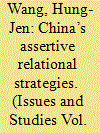| Srl | Item |
| 1 |
ID:
162608


|
|
|
|
|
| Summary/Abstract |
In the past decade, observers in Western countries have been increasingly challenged to describe China’s rising power in one of two ways: as contributing to established world systems, or as a growing threat fulfilling certain predictions made at the end of the Cold War. For some, perceptions of increasingly assertive regional behaviors confirm that China’s self-proclaimed policy of pacifism is being used to cloak selfish national interest and power goals. The current international relations (IR) literature tends to treat China’s assertiveness as evidence that it is indeed a threat, with few attempts to conceptualize assertiveness as a relational strategy. In this paper, the author uses eight current and historical cases involving four relational strategies — engagement, boycotting, reciprocation, and pressing — to examine conventional assessments of assertiveness that focus solely on perceptions of and responses to threatening statements and behaviors made in defense of Chinese national interests. In the end, this paper tries to contribute to the general IR literature that has tended to misinterpret China’s assertiveness, which is actually an identity issue regarding bilateral relationality instead of power or interest calculations.
|
|
|
|
|
|
|
|
|
|
|
|
|
|
|
|
| 2 |
ID:
087569


|
|
|
|
|
| Publication |
2009.
|
| Summary/Abstract |
Why do some democracies break their security commitments whereas others do not? This study proposes a research strategy to answer the question by analyzing the timing of unilateral exits from a coalition military operation. Coalition participants typically do not exit until a military mission has been accomplished. However, in the case of the US-led coalition occupying Iraq since May 2003, 16 states have unilaterally withdrawn their armed forces. Despite the danger such defections may cause to the relationship of these states with the USA, why and when do they exit? The author creates a dataset with a state-month unit of analysis that contains information on 37 partner states and applies a Cox proportional hazard model. The study finds that the occurrence of a national election serves as a strong driving force to accelerate an exit from the coalition. An incumbent leader who faces a challenger who opposes military contributions in Iraq would reverse the policy to support the USA and exit the coalition to win an election, even at the risk of damaging a bilateral relationship with the USA. A change in leadership after an election, on the other hand, failed to be a predictor of the timing of defection. Furthermore, results reveal that the division of power within the government and the constitutional rules that enable significant parliamentary control over executive decisions to use force neither delay nor accelerate the timing of withdrawal. To understand the conditions under which democracies break their security commitments, more attention should be paid to election cycles than to a change in leadership and to types of democratic institutional and constitutional arrangements
|
|
|
|
|
|
|
|
|
|
|
|
|
|
|
|